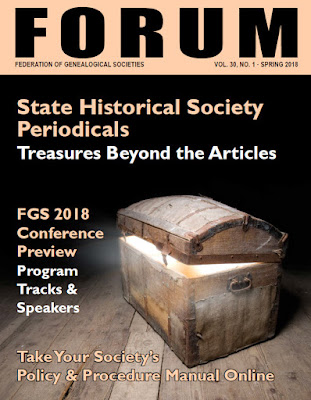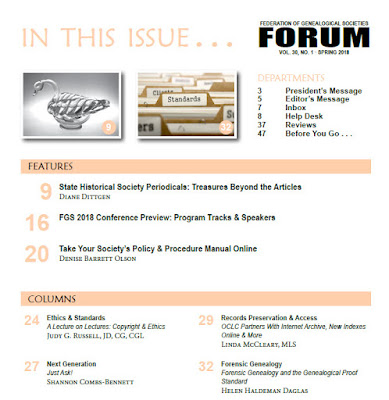Whether you've just taken your first DNA test or a seasoned genetic genealogy researcher, learn from some of the best in the field at
FGS 2018!
The
DNA track this year is designed to be progressive. DNA beginners can start with the sessions on Thursday, while intermediate and more advanced researchers might want to start with the sessions on Friday or Saturday. There are also 3 special DNA workshops, allowing you to go even deeper into the subject.
Thursday, August 23
Creating a Research Plan for DNA Testing by Shannon Combs-Bennett
You have tested your DNA, or are you thinking about it? Still not sure how it will help you with your genealogy research? Learn how to integrate those results into a genealogy research plan to unlock more clues to your family’s past.
MyHeritage DNA 101: From Taking the Test to Understanding the Results by Daniel Horowitz (Sponsored by MyHeritage)
MyHeritage's affordable, easy-to-use DNA home testing kit can reveal valuable family history information and tell you more about your origins. MyHeritage’s DNA Matching service enables you to enjoy exceptional matching capabilities for family history research. Review your Matches, contact and exchange information with others, and learn how you’re related.
DNA Baby Steps by Blaine Bettinger
Although DNA testing has been available for 18 years, there are millions of new test-takers every year. Let’s look at some of the first steps that new test-takers should follow when they open their results for the first time. What do you need to know to understand your test results?
Advancing Your Genealogy Research with DNA by Crista Cowan (Sponsored by Ancestry)
You’ve scoured the census, dug through probates, and even visited the county courthouse. What’s left? DNA. It’s the oldest record of your family, and technology and science are coming up with more ways for you to use it. Come and learn what new tools AncestryDNA has to advance your research and get more out of your DNA results.
Friday, August 24
Doing DNA Right: The Ethical Side of Testing by Judy G. Russell
Genealogy has always involved airing family secrets, but DNA testing poses more immediate risks of disclosing the secrets of living people. How do we use this 21st century tool in the most ethical way possible for all those impacted?
No Chromosome Browser? No Problem by Angie Bush
Chromosome browsers are a tool that can be used by genetic genealogists to better understand their matches, but not all testing services provide them. Learn how to make the most of your matches no matter where you tested.
When You’re Not Who You Thought You Were by Pamela Boyer Sayre
If Y-DNA testing identifies a totally different surname or ancestor than the expected one, what path leads to finding your own true biological identity?
Charts and Diagrams: The Genetic Genealogist’s Bread and Butter by Angie Bush
Understand how to read and interpret all of the various charts in diagrams that are so prevalent in genetic genealogy and learn about tools that can be used to create your own charts to share with family members or in client reports.
Saturday, August 25
Using Genetic Communities™ to Tell Your Story by Crista Cowan (Sponsored by Ancestry)
Genetic Communities™ is an exciting innovation in DNA testing that can take you on a journey through specific stories about our past. In this class, you will learn about how Genetic Communities™ are formed, why you get assigned to a particular Genetic Community™, and how to use them in your research.
Genetic Genealogy: Advanced by Diahan Southard
Have you mastered the basics of autosomal DNA testing? There are several advanced tools that can help you glean more information from your DNA test.
DNA Doesn’t Prove Anything by Angie Bush
A common misconception is that DNA testing “proves” things that were not “provable” before. Attendees should come away from this lecture with a better understanding of the concept of proof and how to avoid common mistakes in interpreting their DNA results.
Advanced Third-Party Tools by Blaine Bettinger
We will examine tools like Phasing, Matching Segment Search, Lazarus, and Triangulation tools offered by GEDmatch, DNAGedcom, and others. These tools are almost always excluded from typical third-party tool lectures.
There are also 3 special DNA workshops and a fun Friday evening event!
Try Your Hand at Genetic Genealogy with Diahan Southard (Thursday)
Working in pairs or small groups you will get a chance to take a DNA case step-by-step to learn exactly how to explore your autosomal DNA match list and make family connections. No computer required. Tickets $50 (advance purchase required)
Visual Phasing Workshop with Blaine Bettinger (Friday)
Visual Phasing is the process of breaking down your chromosomes into grandparent contributions using the DNA test results of 3 siblings (and sometimes even fewer than 3 siblings). Although Visual Phasing is challenging, many genealogists find the puzzle-like nature of the method to be extremely rewarding! After studying the basics of the methodology, we’ll launch into some hands-on examples and exercises! Tickets $50 (advance purchase required)
GEDmatch Workshop with Blaine Bettinger (Saturday)
A hands‐on workshop that guides attendees step‐by‐step through many of the third‐party tools available at GEDmatch. Tickets $50 (advance purchase required)
Evening Event on Friday: Speed DNAting: A Hip Haplogroup Happening
Come learn something about your haplogroup through networking, DNA themed cocktails or mocktails, trivia, and other contests. There will be food and lots of fun and information during this hip happening. Tickets $30 (advance purchase required)
Register now for FGS 2018 in Fort Wayne, Indiana August 22-25!
 Our October webinar will feature Amy Johnson Crow who will present “Finding and Creating Images for Your Blog and Social Media.” Register in advance for this highly requested and popular topic from one of our community's best online marketers!
Our October webinar will feature Amy Johnson Crow who will present “Finding and Creating Images for Your Blog and Social Media.” Register in advance for this highly requested and popular topic from one of our community's best online marketers! 



























